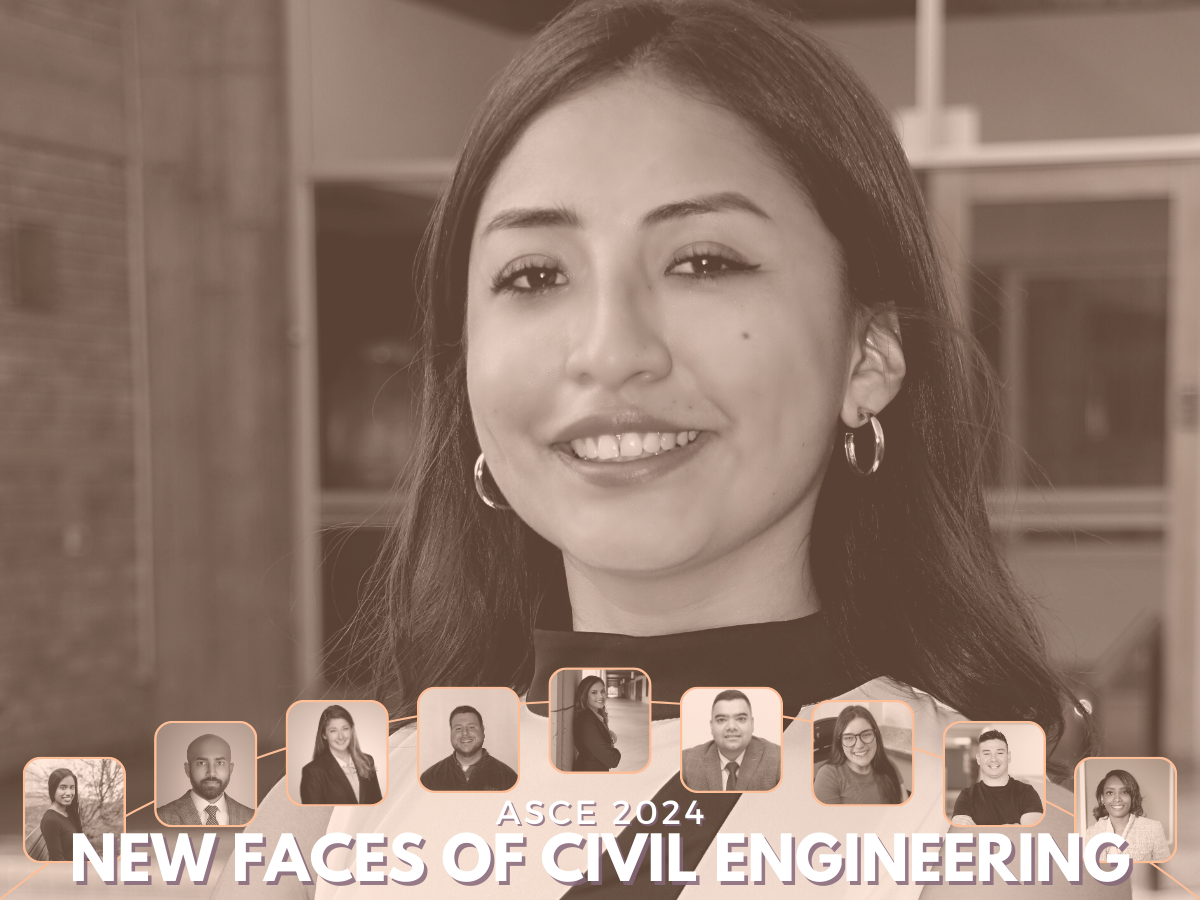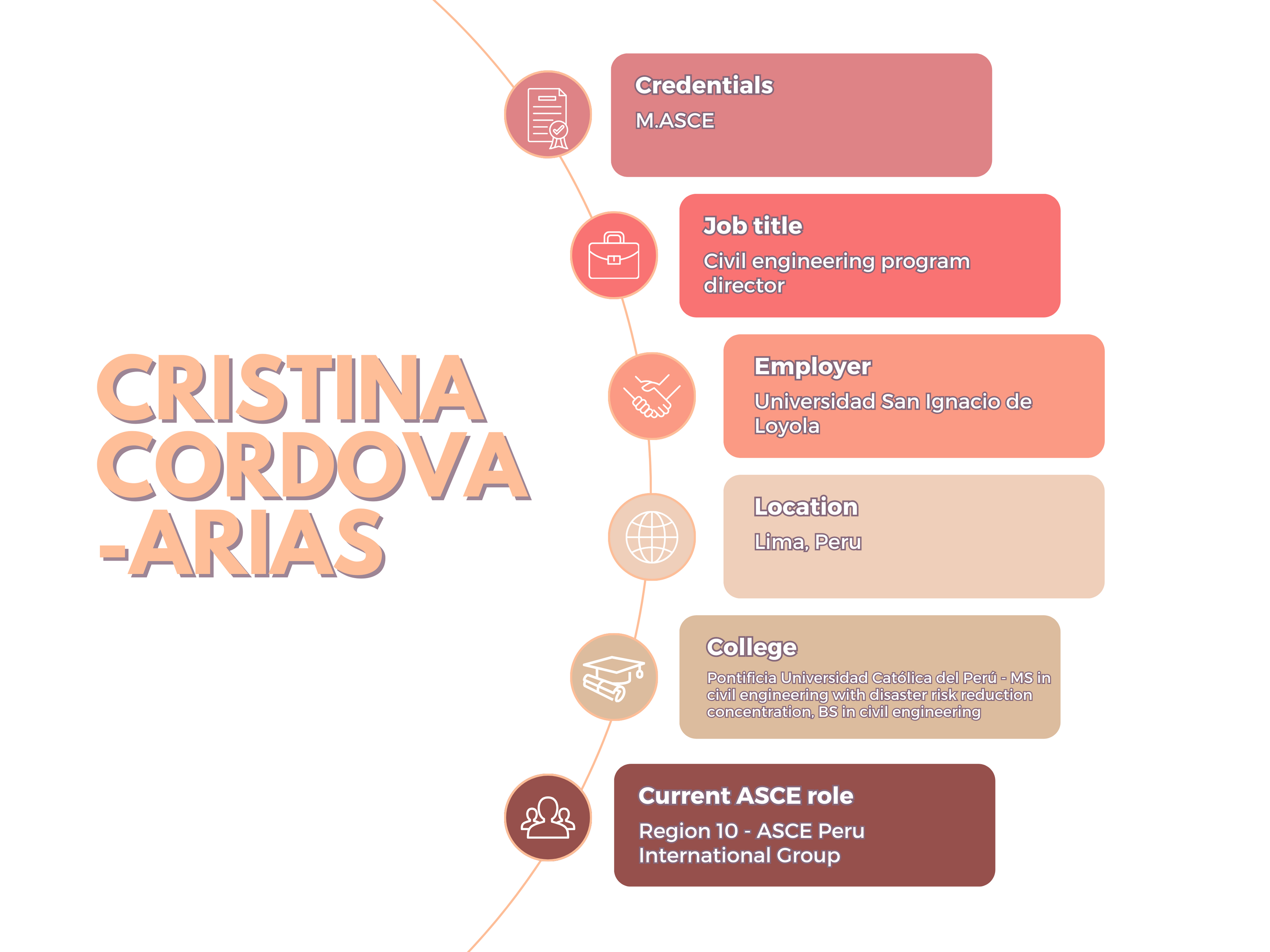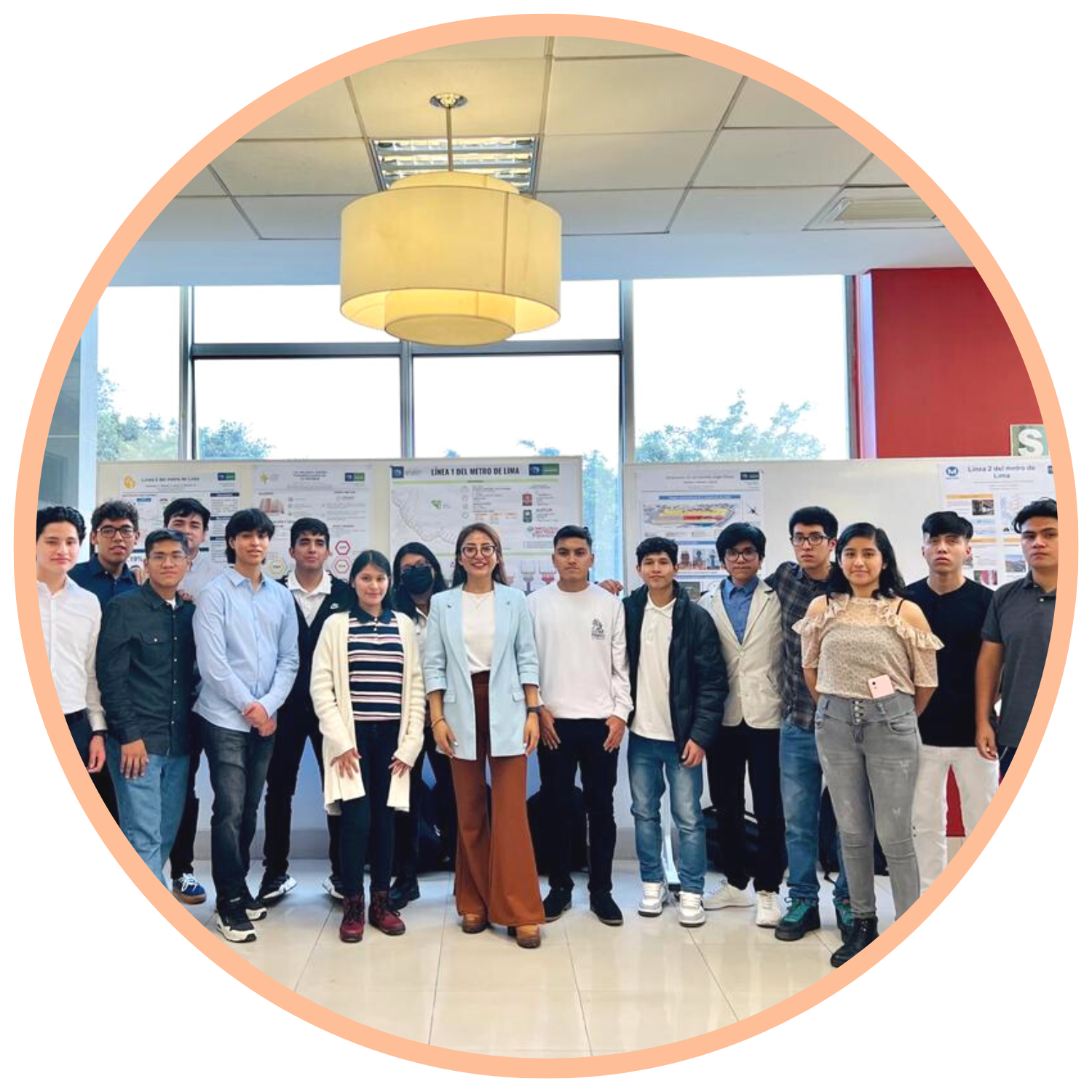

Cristina Cordova-Arias still has the notebook.
She was 7 at the time, maybe 8, and carefully wrote across the front: “Teacher: Cristina Cordova. Subject: Mathematics.”
It was perhaps an optimistic dream for a young girl born in an immigrant working-class family from the Andes of Peru.
And yet …
“I was a child playing at being a teacher, and then life is so amazing that many years later I became a teacher in a university,” said Cordova-Arias, from her office at Universidad San Ignacio de Loyola in Lima, Peru, where she is the civil engineering program director.
“My life has been shaped by many role models, and one of them was my Aunt Marleny, who studied education at university. I always saw her studying for her exams, preparing her material for her classes.”
While her aunt gave her inspiration, it was a very tangible change from the mountains to the big city early in her childhood that may have been the most important step in Cordova-Arias’ journey. Thanks to her mother Maritza’s job at the Basque Cultural Center in Lima, Cordova-Arias and her sister, Shirley, grew up in an environment filled with exceptional role models within one of the most upscale neighborhoods in Peru’s capital. This extended family of role models was crucial in fostering their emotional well-being and imagining a brighter future.
“It was a nice place with many public parks and a public school with a high reputation,” Cordova-Arias said. “It’s not the reality of my country, because in my country we have a high percentage of poverty and informal buildings. So it was a different environment for me with lots of opportunities.”
It’s fair to say Cordova-Arias has taken full advantage of those new opportunities.
She earned a full scholarship to Peru’s top-rated university, graduated top five in her civil engineering class, did travel exchange studies in Madrid and New Zealand, and earned her master’s degree in risk reduction studies. Her work with the World Bank resulted in research published in scientific journals around the world. She serves as the Younger Member Committee co-chair for the Earthquake Engineering Research Institute, and most recently she earned a Fulbright Scholarship to pursue her doctorate in the United States.
ASCE has honored Cordova-Arias as a 2024 New Face of Civil Engineering.
She’s certainly made good on that childhood notebook.
“My grandmothers, for example, didn’t complete high school, so they were really proud of how much their granddaughter has achieved now,” Cordova-Arias said. “It is really great to look back and see where I am now.”
Cordova-Arias recently spoke to Civil Engineering Source about her career.

Civil Engineering Source: What’s the accomplishment or aspect of your career that you’re most proud of so far?
Cristina Cordova-Arias: I’m really proud of several milestones in my career journey. I consider myself a person who is used to breaking boundaries and limitations as a first- generation college student. I learned to beat the odds and navigate unchartered territory.
I believe in education’s power to transform lives. I am the result of my education. It has shaped my personal and professional life.
During the last nine years, I have had the opportunity to travel around the world for academic purposes. I remember with special emotions my first travel abroad to Madrid to participate in an academic exchange for six months.
And six years ago, it was my first time in the United States, attending a conference where I presented my first research paper. It was in Los Angeles – this vibrant academic environment. It was challenging because for me not being a native English speaker. However, sharing my findings with professors whose works I have read and admired was the beginning of my research journey.
Last year was also remarkable for my professional growth. I received exciting news that I have a scholarship for pursuing a Ph.D. in the United States, supported by the Fulbright Program.
And another accomplishment that I am so proud of is being the youngest female director of a university civil engineering department in Peru.
I feel so much gratitude to the people who have helped me along the way because these awards are the result of much hard work and sacrifice from my family who have always supported all my decisions.
Source: What kind of impact do you hope to make on the profession?
Cordova-Arias: After experiencing the 2007 Peru Earthquake and seeing the huge damage from this disaster, especially in vulnerable communities, I decided that my future career would make someone’s life better. That’s what I wanted. And now I envision my future working to achieve earthquake-proof buildings and more resilient societies.
In Lima, almost 80% of buildings have been built without meeting seismic design criteria and technical supervision, increasing their physical vulnerability.
When I started working on a World Bank project in partnership with the Ministry of Education of Peru, I found a similar situation for critical infrastructure, like school buildings. So taking into account my special commitment to education, I have put all my efforts into reducing earthquake risk to school buildings. Schoolchildren have the right to learn in a safe building.
This work also challenged me to get out of my engineering background and apply a diverse multidisciplinary approach to develop a holistic framework to achieve earthquake system-resilient school buildings.
Now I know I need to become better in order to better my country. So, after my Ph.D., my goal is to advance public policies for shaping resilient societies. I am confident that my doctorate will increase my capacity to lead transformative initiatives to guarantee safer communities.
Source: You’ve mentioned connecting your work to humanity. Why is that so important to you?
Cordova-Arias: Because I feel engineering has to have a broader perspective – not only maybe focused on economic or technical criteria. It’s necessary to also be aware of human needs. Does this solution provide a response to that end user’s needs?
It’s important to consider every stakeholder in the development of a new solution. But maybe it’s just because of my life experience. When I review my life back, I wonder what are the odds of a girl from the Andes of Peru traveling to New Zealand to learn about earthquakes from scholars at the most prestigious universities in the world?
This experience brought me a new perspective on solutions. Maybe in Peru we have an idea of how to do something. But after all of this international academic experience, for example in New Zealand, I learned that after an earthquake how they recovered their cities, and it’s completely different from here. They have a preventative culture, a mitigation culture. They act before the disaster. In Peru, we act after the disaster.
I traveled to the south coast of Peru, about two hours from Lima. And 16 years after the earthquake of 2007, the city is not recovering at all. Many people continue living in temporary housing without public services. They have to buy water to satisfy their needs. So I think it’s necessary to integrate many subjects – engineering, public policy, and social science to find solutions.
Also, all my volunteer work in nonprofit organizations since I was in high school have allowed me to observe different educational inequalities. I participated in another nonprofit organization called TECHO. Every Sunday I went to a different informal settlement located in Lima to build temporary housing for families who are really in need.
All of this experience just increased my commitment to solving these problems.
These extracurricular activities also help me develop new skills, soft skills. And now as a director of a university program, I implement these lessons in the academic curriculum of my students. I encourage them to do courses on public speaking. Also, this year my goal is to create a new ASCE student chapter to participate in an international academic environment.
I want to inspire and empower them to be the next generation of civil engineering.
All of these things, they are maybe big goals. But from my experience, I would say that nothing is impossible.



